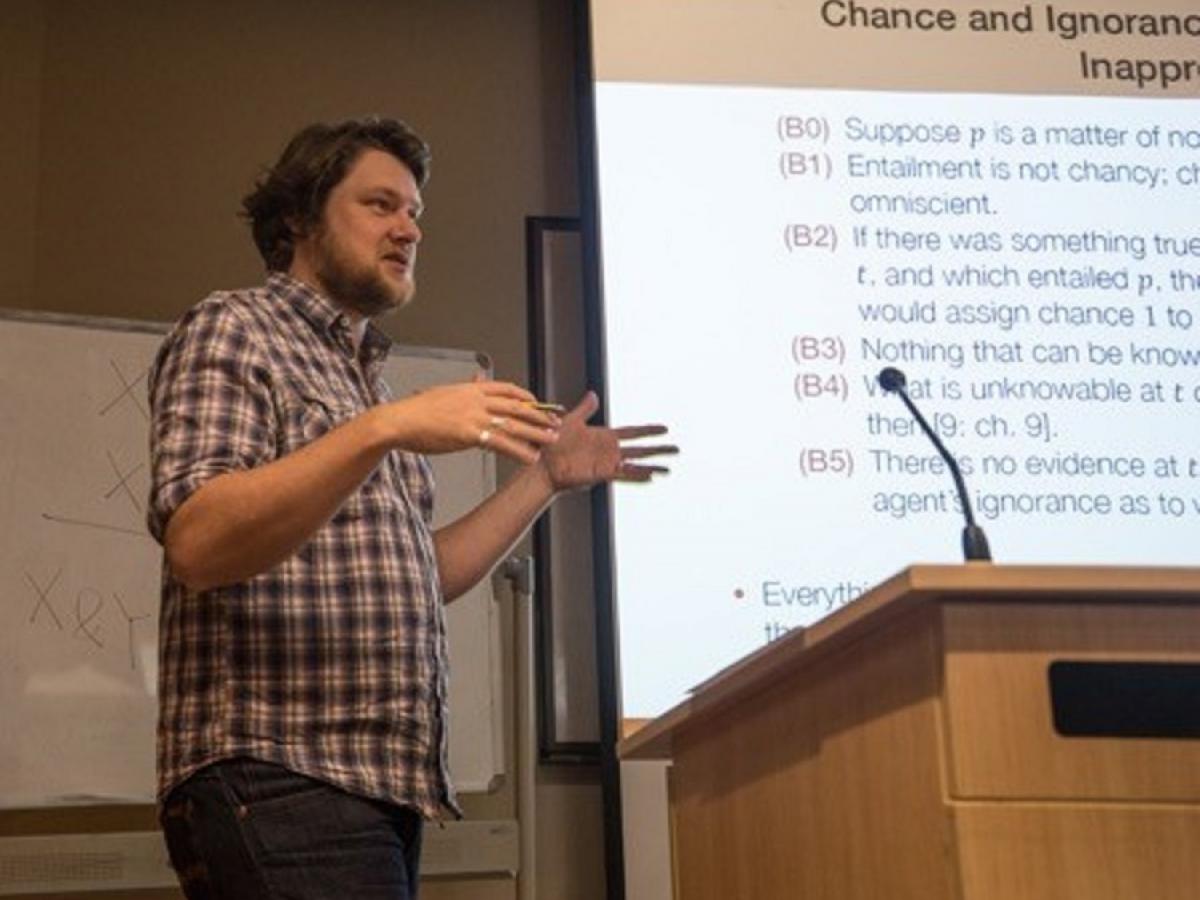This is how I teach
This month we spoke to Associate Professor Antony Eagle, philosophy lecturer from the School of Humanities. Antony speaks about his methods of student engagement and how he strives to accommodate the needs of his students as they try to balance study, work and life commitments. He also discusses how he uses technology to assist with this, making education more accessible for his students.
What do you like most about teaching in your discipline?
One nice thing about philosophy as a subject is that there is no shallow end. From day one of first year, students are grappling immediately with the same deep questions that have animated philosophical inquiry since at least Plato and Aristotle. What is good? What is truth? What is knowledge? As a teacher, I feel lucky that my students and I can get straight into the good stuff. It’s great as a teacher-researcher, because it’s often possible to bring things you are thinking about into the classroom, even at first- and second-year levels. For students, too, they are immediately finding themselves in conversation with the most influential figures in the history of the discipline - that can be pretty intoxicating stuff!
On the other hand, even students who are interested in these questions often lack a good idea of what makes for a good answer, or even what makes for a good method for coming up with answers. So for me one of the most satisfying parts of teaching philosophy is helping students develop their skills in doing philosophy, not just in knowing about what other philosophers have said. Some of this is covered in our formal logic courses, which are great fun to teach (partly because they’re quite different to our other courses in the teaching approaches required).
How would you describe your approach to teaching?
There are lots of teaching models and approaches out there, many amounting to nothing more than pedagogical snake oil. The evidence base for many of them is pretty thin; and many of them try to use interventions in the classroom to paper over systemic disadvantages that students face outside the classroom. So I try to keep it pretty simple: (1) keep the focus on the content and learning outcomes; and (2) give students autonomy and flexibility in how they wish to engage with the course.
I’m lucky to teach a subject which has intrinsic interest for most students who come to it. So long as you can communicate an overall narrative that shows how the more abstract topics in a course connect to those ‘big questions’ that students have an existing curiosity about, it is relatively easy to keep students connected with the course – especially because of the emphasis I place on doing philosophy, not just learning about it. (It no doubt helps that I am myself very enthusiastic about talking philosophy.) By contrast, I place little emphasis on personal connection, except as mediated by shared interest in the course material. Students are there to learn, and I’m reluctant to introduce activities to the classroom whose connection with the course outcomes is at best opaque.
While my approach to course delivery is fairly austere, I provide leverage by granting students a great deal of autonomy over their engagement with courses. I continue to use asynchronous lectures (with very detailed lecture notes), and non-timetabled workshop participation activities – this is to allow students control over their time and resource expenditure. I have no attendance requirements as for many of our students, the best way to engender a sense of belonging is to allow them to participate without feeling like they are getting a second-class experience because of their outside commitments. I publish all assignments at the start of semester to allow students to plan ahead; if that means time-poor students only engage extensively with a couple of lectures, so be it.
In all these things, I strive for administrative predictability; not just being transparent about matters of policy, but ensuring that even the connection between student effort and student results is somewhat predictable. This strikes me as good practice in general, but it is especially important for students with work or care commitments, or living with disability, who all face much tougher accessibility constraints than the stereotypical student we so often think about when designing our courses.

What is your favourite way to use technology to enhance learning?
Good philosophy doesn’t need a lot of fancy infrastructure, and I don’t do anything in my teaching or marking that in principle couldn’t be done manually. Nevertheless, Canvas makes it easy to introduce some simple but effective practices. First, I am a big fan of module requirements – I always require students to ‘mark as read’ the course syllabus and assignment details before they can proceed to the first week’s lectures. Second, I am a bit of an evangelist for anonymous grading. This reassures students that their work is being assessed only with regard to the learning goals for the activity, and removes any apprehended bias from the process. Third, I make extensive use of graded discussion boards; these provide a common ground for workshop discussion, and a genuinely useful surrogate for those who cannot/will not attend the workshop.
Finally, I make extensive use of interactive quizzes, especially in my mathematical logic courses, with lots of helpful-but-automated feedback in the form of model answers and ‘common mistakes’. In logic, at least, all correct answers are like, but most incorrect answers are alike too – this makes automated feedback practicable in a way that it is not for the long-form essay. Probably most important, however, is the way that technology now makes education accessible. The traditional on-campus model poorly serves those who can’t make it to scheduled classes, or who need extra time to absorb lecture content, or who find the 50 minute ‘monologue with interruptions’ lecture an ineffective means of communication.
My teaching is much more inclusive than it was, facilitated by some pretty elementary technologies (e.g., recorded lectures, asynchronous discussions, and electronic distribution of course material).
How does your teaching help prepare students for their future?
Philosophy is pretty bad preparation for a job (unless that job is ‘philosophy professor’) – but it is excellent preparation for a career. Our students will almost certainly move from field to field across the duration of their working life, and any practical experience they acquire at university is likely to be obsolete before they even clock on for the first time. So what is overall most beneficial – to them and to their employers – is to try and foster flexibility and general thinking skills in our graduates. In working life, key decision makers are rarely the most knowledgeable people about the specifics of the decision being made. Rather, they deploy critical analysis, knowledge of general principles, logical rigour, and the ability to see the interlocking considerations favouring one side or another. In short, they deploy the skills of the philosopher. It is possible to develop these skills, but it doesn’t just happen by osmosis – explicit instruction is key, and philosophy is the place where that happens, especially with respect to logical analysis and argumentative strategy. But all this focus on careers is a bit myopic. Really, the best reason to study philosophy isn’t to improve how useful you will be to a prospective employer; it is to have the chance to think about some of the deepest and hardest questions faced by human beings, and to acquire a lifelong love of wisdom that will provide you with ideas and principles that will guide you in life and as responsible members of society.

